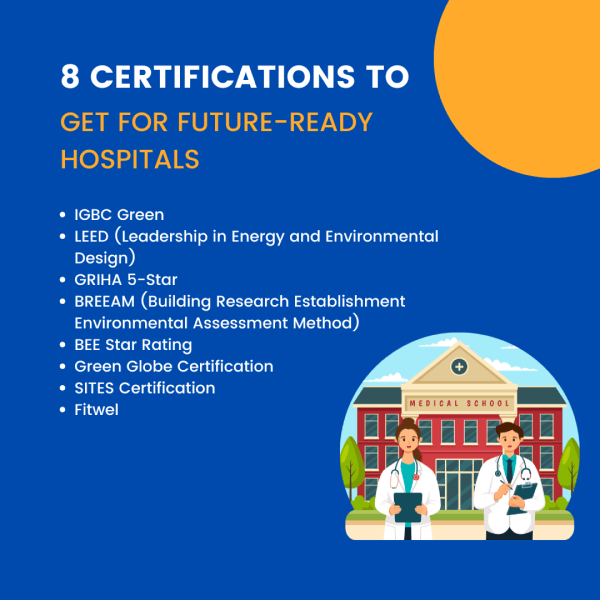In today’s world, we’re all looking for ways to be...
Sustainability is becoming important in every industry, and hospitals are joining the trend. As more people realize the value of eco-friendly practices, hospitals are taking steps to reduce their impact on the environment while improving how they operate. By adopting sustainable measures, hospitals can help the planet, save on energy and water costs, and create better spaces for patients, visitors, and staff. Being sustainable in hospitals isn’t just about using less energy and water; it’s about making the hospital environment healthier and more comfortable. Things like natural light, fresh air, and energy-saving designs can make a big difference in how patients heal and how staff feel at work. By going green, hospitals can meet global sustainability goals and set an example for their communities.
To help hospitals achieve these goals, green hospital certifications are essential. These certifications prove that a hospital meets high standards for being environmentally friendly and energy-efficient. They also prepare hospitals to face future challenges in healthcare and the environment, making them future-ready hospitals. In this blog, we’ll break down the most important sustainability certifications, explain why they matter, and show how they can help create sustainable healthcare facilities.
A Quick Peek on Sustainability Certifications
Sustainability certifications are special approvals given to buildings, including hospitals, that show they meet certain eco-friendly standards. These certifications prove that a hospital is designed and run in a way that helps the environment, saves resources like water and energy, and creates healthier spaces for everyone inside. For hospitals, sustainability certifications focus on things like using less energy, cutting down waste, improving air quality, and using materials that are better for the planet. These certifications are especially helpful for future-ready hospitals because they prepare healthcare facilities to handle environmental challenges while also saving money in the long run. When a hospital is certified, it shows a commitment to creating a better space for patients, staff, and the environment.
8 Certifications to Get for Future-Ready Hospitals
Hospitals that aim to be environmentally responsible and efficient can benefit from earning sustainability certifications. These certifications ensure the facility meets high eco-friendly standards while improving operations and patient care. Here are eight key certifications hospitals should consider to become future-ready hospitals:

1. IGBC Green
The IGBC is known for recognizing hospitals that follow eco-friendly building practices and promote sustainability. This certification focuses on improving the environmental performance of healthcare facilities and addresses key factors like energy efficiency, water conservation, indoor air quality, waste management, and the use of sustainable materials. Hospitals with this certification are dedicated to lowering their carbon footprint and creating a healthier environment for patients and staff. It helps make sure healthcare buildings are designed and run in ways that support well-being and protect the environment in the long run. This certification also helps hospitals stay ahead of future environmental challenges while contributing to the global movement towards sustainability.
2. LEED (Leadership in Energy and Environmental Design)
LEED certification is one of the most well-known eco-friendly certifications for hospitals worldwide. This certification is started by the U.S. Green Building Council (USGBC), and it provides guidelines to help hospitals become more energy-efficient and environmentally friendly. This certification only focuses on important areas like saving energy, using water wisely, improving air quality, and using sustainable building materials. Hospitals with this certification will get the benefits from lower energy bills, better water management, and healthier indoor spaces, which will help hospitals to improve outcomes for patients and staff. This certification for Healthcare facilities is specifically designed for hospitals, for addressing their unique needs like infection control and the use of advanced medical technologies.
3. GRIHA 5-Star
GRIHA (Green Rating for Integrated Habitat Assessment) is a system that rates how sustainable buildings are. This certification is given to hospitals that use energy wisely, manage water, handle waste properly, and create healthier indoor spaces. The 5-Star rating is a symbol of excellence in green building and highlights hospitals that reduce their environmental impact while providing a better space for patients and staff. Hospitals with this certification not only save energy and resources but also offer cleaner, healthier spaces. When a hospital has GRIHA certification, it shows a hospital’s commitment to protecting the environment and sets a good example for others to follow. It also helps hospitals meet future regulations and ensures their buildings remain sustainable in the long run. This certification helps make healthcare facilities more efficient, affordable, and environmentally friendly in the future.
4. BREEAM (Building Research Establishment Environmental Assessment Method)
BREEAM is one of the world’s longest-established sustainability assessment methods. It assesses a building’s environmental impact based on criteria such as energy efficiency, water use, materials, waste management, and biodiversity. When a hospital gets this certification, it means the hospital is designed with green space to reduce its impact on the environment while using energy efficiently. With this certification hospitals can lower operational costs and provide a healthier environment that improves patient care. This certification also supports hospitals in meeting local environmental standards and regulations while boosting their reputation as leaders in sustainability. By focusing on reducing waste and energy use, BREEAM-certified hospitals can operate more efficiently, providing a positive impact on both the environment and patient care.
5. BEE Star Rating
The Bureau of Energy Efficiency (BEE) is a certification that rates how energy-efficient healthcare facilities are. This rating system is based on certain factors like energy consumption, HVAC systems, lighting, and the use of renewable energy sources. Hospitals with BEE Star Ratings are known for using energy efficiently, cutting costs, and reducing their impact on the environment. A higher star rating indicates better energy efficiency, which ultimately leads to lower carbon emissions and a more sustainable operation. These certifications ensure that hospitals meet healthcare standards while also helping the environment, benefiting both the community and the planet. This certification encourages hospitals to use green technologies, making healthcare more eco-friendly. It helps hospitals stay competitive and create a healthier environment for everyone.
6. Green Globe Certification
Another name in our list is Green Globe, a worldwide certification program that started in the tourism and hospitality industries but is now being used in healthcare too. It focuses on making buildings more energy-efficient, saving water, managing waste better, and using sustainable practices in daily operations. When hospitals have a Green Globe certification, it means they incorporated eco-friendly strategies in hospital design while running efficiently. It shows a hospital’s commitment to giving patients quality care in a way that’s good for the environment. This certification also helps hospitals improve their operational performance while reducing their carbon footprint, ultimately benefiting both the environment and the healthcare community. It’s an excellent choice for hospitals aiming to integrate sustainability into every part of their operations.
7. SITES Certification
This certification makes outdoor spaces more eco-friendly, especially in cities. It’s not just for parks and public areas but is also becoming important for hospitals with big outdoor spaces. SITES looks at how these areas help the environment, people, and wildlife. When a hospital has this certification, they create sustainable outdoor spaces that help patients heal and bring the community together. When hospitals add green space, it can make patients feel better, improve their experience, and create inviting areas for visitors and staff. This certification also helps hospitals save energy, use less water, and improve air quality, all of which are important for healthcare. Features like rain gardens, special pavements, and native plants can help hospitals reduce their environmental impact and create calming spaces.
8. Fitwel
Fitwel focuses on making buildings healthier for the people who use them, through smart design choices. For hospitals, this means creating spaces that help patients heal faster and make staff feel more comfortable and productive. It encourages things like natural lighting, fresh air, and easy access to outdoor areas, which improve both physical and mental health. Hospitals with this certification also focus on reducing noise, improving air quality, and keeping the temperature just right all of which help create a calm, healing atmosphere. These features not only benefit patients but also help staff feel less stressed and more energized. Fitwel also encourages hospitals to create spaces for relaxation and socializing, which can improve teamwork and morale.
Create Sustainable Hospital With Inner Value Architects
As hospitals continue to play a vital role in society, adopting green hospital certifications is essential for creating healthier, more resilient healthcare environments. These certifications not only improve a hospital’s environmental performance but also contribute to better patient care, staff well-being, and operational efficiency. By pursuing certifications hospitals can demonstrate their commitment to sustainability and set themselves up for a future that prioritizes both human and environmental health. If you’re looking to create a sustainable hospital design, you can consult with Inner Value Architects to ensure your hospital meets these green certification standards. Future-ready hospitals are those that not only provide top-quality healthcare but also lead the way in creating energy-efficient hospital designs and regenerative spaces for generations to come.










